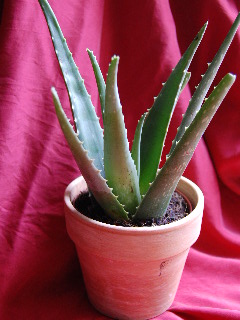
Here’s a great plant to work with that provides interest to the casual houseplant grower and usefulness to those concerned with health as related to horticulture.
We could just as easily include the aloe vera in our “Plants” section of GardenVoice since it is definitely a popular and easy to grow houseplant. Instead, we’ve chosen to list and discuss it in the “Health” section of our site because of its many medicinal, healing, and health related qualities.
First, let’s look at aloe vera as the friendly and distinctive gardener’s pal that it is, and see what is required to assure its health and vigor as a welcome member of your collection of houseplants.
A start of aloe vera can be purchased, usually at very little cost, from your favorite garden center.
It is one of the succulents, which means it stores water in its leaves and thus does not require a lot of watering on your part in order to thrive. In fact, the aloe vera plant does best when the soil is watered thoroughly and then allowed to dry out before watering again. Too much moisture can stunt or even rot the plant.
The aloe vera originates in warmer climates (notably Africa). As always, a plant does best when its native conditions are imitated as you try to cultivate the plant in your part of the world. This means growing your aloe vera in a loose, sandy, well-drained soil, giving it plenty of sunlight, and not exposing it to freezing temperatures.
A nicely potted aloe plant can be located outdoors on your deck or patio during the warm summer months and then moved indoors to a sunny window where it will over-winter well and provide visual interest with its uniquely toothed and spiked leaves.
Your potted aloe is basically dormant during this indoor winter period and thus requires much less water.

Now, on to the medicinal qualities of the aloe vera plant.
The most commonly mentioned first-aid use for the gel inside the aloe vera leaf is as a treatment for minor burns of the skin. This, in fact, is why many keep an aloe plant in their home. They consider it just as much a part of the “medicine cabinet” as the bottle of rubbing alcohol or the box of band-aids.
Aloe vera gel is also said to sooth sunburn, and bottles of the gel are sold alongside other sun tanning and sunburn treatment remedies. Further, it is believed to aid in healing other skin irritations and wounds.
Aloe vera gel is an additive in many skin conditioner and beauty treatment products, its topical application useful in moisturizing and smoothing the skin.
Taken internally, aloe vera juice is believed to sooth the stomach and to aid in digestion in much the same manner and to the same extent that adding yogurt to the diet does. In this way, it is also said to be helpful in treating stomach ulcers and poor elimination.
The consumption of aloe vera juice is also believed to have a stabilizing effect on blood sugar levels and to aid in the moderation of high cholesterol levels.
Though all of the medicinal and healing qualities of aloe vera have not been completely documented and verified by medical authorities, aloe vera plant remains a popular houseplant to have on hand. And a little dab of gel from the leaf will provide a natural treatment that certainly helps to sooth minor burns and irritations of the skin.
 Here’s a great plant to work with that provides interest to the casual houseplant grower and usefulness to those concerned with health as related to horticulture.
Here’s a great plant to work with that provides interest to the casual houseplant grower and usefulness to those concerned with health as related to horticulture.
 Now, on to the medicinal qualities of the aloe vera plant.
Now, on to the medicinal qualities of the aloe vera plant.